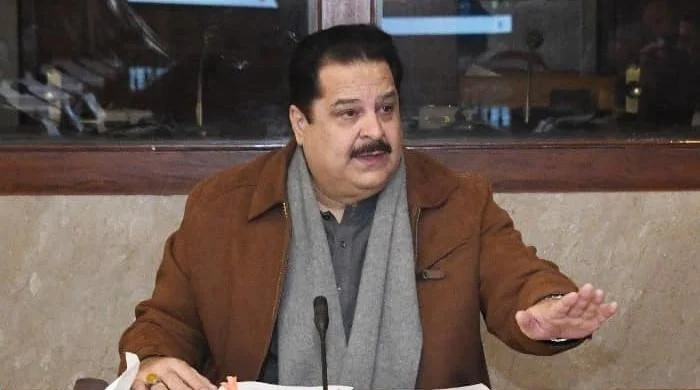Tassaduq Hussain Jillani, Pakistan’s 21st chief justice, received on Wednesday the 2025 Bolch Prize for the Rule of Law by Duke Law School’s Bolch Judicial Institute for his outstanding contributions to judicial independence, religious freedom, and gender equality in South Asia and beyond.
Receiving the honour at Duke University, Jillani expressed deep gratitude, calling the award a symbol of shared values — democracy, freedom, dignity, and the rule of law — which he said are under threat globally.
“I feel humbled because the Carl and Susan Bolch Prize for the rule of law sets a tall moral standard to recognise the lifetime achievement of an individual or series of acts of an individual or an organisation creating, promoting or preserving the importance of the rule of law, nationally and internationally,” he added.
Highlighting rising religious intolerance and extremism, he pointed to conflicts in Gaza, Nigeria, India, and elsewhere, emphasising that no faith condones violence and all uphold the principle of mutual respect.
Jillani recalled his landmark suo motu judgement in response to the 2013 Peshawar church bombing and threats to the Kailash tribe. The ruling affirmed that religious freedom is multidimensional and constitutionally protected, extending to belief, expression, and practice.
He said, at that time, he directed the state to establish a task force for religious tolerance, revise curricula, eliminate hate speech, and protect minority worship places — initiatives he said were essential for a functional democracy.
“In modern democracies, it falls to the judiciary to play a more proactive role in enforcing the constitutional mandate and defending the people’s fundamental rights of equality, freedom and justice for all,” said the former chief justice during his acceptance speech.
Jillani pointed out that the anthem of the Supreme Court of Pakistan, which was authored by him and titled “Justice For All”, was made part of the judgement for two reasons; firstly, because it is a constant reminder of the vision of the founder of the country and the ideals which reverberated the movement for the creation of Pakistan.
“Secondly, the anthem cautions the nation that if the values which went into the making of the country are not lived by, the nation would bear a heavy cost. This anthem is perched along with its mosaic rendering on the full wall beside the entrance gate of the Supreme Court,” he added.
“The judiciary alone cannot ensure a tolerant society,” Jillani told the audience. “Citizens, regardless of profession or background, must play their part in upholding justice and pluralism.”
He concluded by urging the United States to uphold its founding ideals and moral leadership on the global stage, quoting George Washington’s farewell address as a call for enlightened global conduct.
“Democracies around the world would immensely benefit from such initiatives. Your law school is tasked with producing leaders in the public domain who can, besides promoting the rule of law, be catalysts for social change. By their thoughts and with their actions, they can influence the course of events both nationally and internationally,” said Justice Jillani while lauding the law school.
The Susan and Carl Bolch Jr. Prize for the Rule of Law is awarded annually by the Bolch Judicial Institute of Duke Law School to an individual or organisation who has demonstrated extraordinary dedication to the rule of law and advancing rule of law principles around the world. By honouring those who do this work, the Bolch Prize draws attention to the ideals of justice and judicial independence and to the constitutional structures and safeguards that undergird a free society.
Former CJ Tassaduq Jillani’s profile
After serving for more than 10 years as a Supreme Court judge, including a brief tenure as the CJP, Jillani retired as the top judge on July 10, 2014.
The 74-year-old Justice (retired) Jillani was born on July 6, 1949. He did his LLB from the University of Punjab and started practising law at the Multan district courts in 1974.
Jillani became an apex court lawyer in 1983. He was sworn in as a Lahore High Court judge in August 1994. And after ten years, he was elevated as a SC judge in July 2004. He served as a top court judge till the imposition of the state of emergency in November 2007. He then again took oath as the SC judge in 2008. He was appointed as the chief justice of Pakistan in 2013.
In August 2023, the ex-CJP received the 2023 American Bar Association (ABA) International Human Rights Award, in recognition of “his courageous judgements against political impunity in a time of crisis and for defending judicial independence” in Pakistan.
He was also awarded the 2020 J Clifford Wallace Award by the J Reuben Clark Law Society (JRCLS) to honour his “extraordinary career as a judge and a jurist”.
Known to be a “balanced” judge, Justice Jillani delivered key rulings of great significance on domestic and international concerns.
These include his judgements enforcing fundamental rights, gender equality, declaring the right to education a fundamental right, holding that in an age of globalised inter-dependence, dual nationality should be permitted, laying down guidelines for qualitative improvement in legal and medical education, both in the Lahore High Court and the apex court.
However, perhaps, the two rulings that brought him to the foreground were the right of an adult woman to marry a person of her choice in Islam and his landmark ruling on minority rights in 2014, after he took suo moto notice of the matter of the protection of minorities, following a blast in a church in Peshawar that claimed 81 lives.

